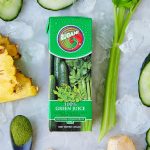#EatGreen: Simple Tips for Plant-Based Eating
With sustainable food consumption on the rise, eating plant-based is currently one of the biggest food trends in the world. More than just a fashion, eating Green also boasts a variety of benefits – from reversing chronic diseases to saving our precious water resources. Every year, hundreds of people are including more plant-based meals into their diet, and it has never been easier (or tastier) to do so.
Green Monday SA is a fun way to introduce plant-based meals to your lifestyle. This global movement, promoted and led by Humane Society International in South Africa, encourages South Africans to swap the meat, eggs and dairy on their plates for plant-based alternatives, one day every week.
Although it might seem daunting, introducing more plant-based meals to your diet is easier and tastier than you think. If you are interested in adopting a plant-based lifestyle, knowledge and preparation are key! These simple tips will help you get started on eating more plant-based foods:
- Know the difference: The first step to eating plant-based is to understand what it means. Plant-based meals are free from all animal-derived products, including red meat, chicken, fish and seafood, eggs, dairy, gelatine and honey. Fill your plate with a variety of plant-based alternatives such as vegetables, fruit, grains, nuts, seeds, legumes and alternatives (listed below).
- Understand why: Educating yourself on the benefits of eating plant-based will make this way of eating even easier. Studies show that reducing your meat consumption and eating more plant-based meals can help improve your health and lessen your carbon footprint. Delve into books and articles, listen to talks, and refer to documentaries and videos to learn more.
- Collect recipes: Build up a database of easy and tasty recipes you look forward to feasting on. Eating Green doesn’t mean you have to miss out on your favourite foods. Today there are many products on the market that act as alternatives to animal-based ingredients and food items. Some, like nut milk and veggie patties, come in ready-to-consume forms, while others, like chickpea flour and flax seeds, are manipulated in interesting (but easy) ways to whip up traditional culinary creations. There are thousands of recipes available on the Green Monday SA website to help fulfill your culinary desires.
- Plan your meals: Planning your meals will help you sail through this journey with ease. Not only will it help you follow a balanced diet and create excitement for what is to come, but planning also eliminates possible frustration or failure when creativity in the kitchen dives low.
- Stock up: Once you have your database of plant-based recipes saved and your meals planned out, it’s time to draw up a shopping list and fill your pantry and fridge. Make sure you have all the non-perishable essentials for daily use and think about how often you need to make a trip to the local market or retailer for fresh produce. Take note of the available alternatives that will make it easier for you to replace the meat, eggs, and dairy in your pantry and fridge:
Dairy products:
- Milk is one of the easiest products to replace when transitioning to a plant-based lifestyle and there are plentiful options available. Soya milk is the most commonly known non-dairy milk replacement, but if you are not a fan of this bean-based version, you can also opt for rice milk, oat milk, almond milk, coconut milk or a combination of these. You can also make your own by simply placing nuts, oats or soya beans into a high-speed blender with three times the amount of water, vanilla extract and dates, blend it until smooth and strain it through cheesecloth.
- According to the masses, cheese is the hardest food item to “give up”. Luckily you don’t have to! You can replace your cheddar, mozzarella and even cream-cheese with a non-dairy version. These cheeses are coconut-oil based and taste just like the original. Nut-based cheeses are also delicious and easy to make at home.
- Thick and creamy soy-based yogurt is a great-tasting topping for muesli and fresh fruit. You can have it smooth, chunky, or as a drinking-yogurt.
- Even cream can be replaced by coconut cream or a non-dairy alternative. Use it in desserts or as a dressing on top of soups and in curry sauces.
Meat:
- Gone are the days of bland cardboard patties. Today, we can feast on a variety of flavoursome and juicy meat alternatives – perfect for the braai, or in home cooked meals like stews, pasta, pizzas and wraps. Think patties, sausages, chicken-style strips, nuggets, schnitzels, meatless balls, polony, and even bacon. Stock up on a few products to keep in your freezer or have fun with friends or the kids by making your own.
- There are also many fresh and whole-food ingredients you can use to replace meat, like lentils and beans in lasagne, shepherd’s pie and enchiladas or tofu and mushrooms in stir-fry’s and skewers.
Eggs:
- Think you can’t have scrambled eggs on a plant-based diet? Think again! Firm crumbled tofu, fried with Kala Namak (black salt), turmeric and a dash of pepper and spices make for a terrific scramble breakfast.
- Another eggy-favourite that you can mimic at home is a chickpea omelette. When this versatile flour is mixed with non-dairy milk, baking powder and spices, it creates a beautifully fluffy omelette on the inside with a crunchy layer on the outside.
- Baking without eggs is also as easy as (vegan) pie. There are many ingredients that you can use as egg-celent alternatives, including apple sauce, bananas, ground flax seeds and aquafaba (chickpea brine).
Taking on the challenge of reducing your meat, dairy and egg consumption is also easier when you’re not alone. There are many community groups, social media platforms, dinner clubs, and events happening around South Africa that you can join or refer to for support. With a little bit of knowledge, a few delicious recipes and a pantry full of plant-based products, you’ll whip up great green meals in no time!
About Humane Society International:
Humane Society International and its affiliates together constitute one of the world’s largest animal protection organisations. For more than 25 years, HSI has been working for the protection of all animals using science, advocacy, education and hands-on programs. Celebrating animals and confronting cruelty worldwide – on the Web at www.hsi.org.
About Leozette Roode
Leozette Roode is the Media and Outreach Manager for Humane Society International – Africa, and Green Monday SA, as well as the author of the first published 100% plant-based cookbook in South Africa; The South African Vegan Cookbook. She has contributed articles and recipes for many publications, and has appeared on shows like Afternoon Express, Tussen Ons, ENCAfrica and Pasella. Leo has a passion for healthy, sustainable living, and she shares this passion through her blog Leozette.co.za, and through cooking demonstrations and workshops.
For more information, recipes and plant-based news, visit the Green Monday SA website and Leozette’s plant-based blog or contact Leozette via LRoode@hsi.org. Rugani Juice is also a proud partner of Green Monday SA, watch their social media pages and blog every Monday for great articles and delicious plant-based recipes.




